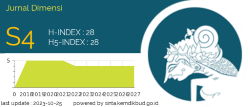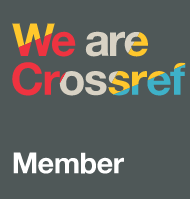PENGARUH BERBAGI PENGETAHUAN DAN BUDAYA KERJA TERHADAP KINERJA PEGAWAI DENGAN EFIKASI DIRI SEBAGAI MEDIASI
Abstract
Penelitian ini bertujuan untuk menganalisis dan menjelaskan pengaruh berbagi pengetahuan dan budaya kerja ASN BerAKHLAK terhadap kinerja pegawai dengan efikasi diri sebagai mediasi. Penelitian menggunakan metode kuantitatif. Metode pengambilan sampel adalah metode sampling jenuh. Teknik pengumpulan data menggunakan kuesioner yang disebarkan melalui googleform kepada 63 orang pegawai pada Badan Pengelolaan Keuangan dan Pendapatan Daerah Kota Pariaman. Pengolahan dan analisis data menggunakan SmartPLS. Hasil analisis menunjukkan bahwa berbagi pengetahuan berpengaruh positif signifikan terhadap kinerja pegawai, budaya kerja BerAKHLAK tidak berpengaruh positif siginifikan terhadap kinerja pegawai, efikasi diri berpengaruh positif signifikan terhadap kinerja pegawai, berbagi pengetahuan berpengaruh positif signifikan terhadap efikasi diri, budaya kerja BerAKHLAK berpengaruh positif signifikan terhadap efikasi diri, efikasi diri berperan sebagai parsial mediasi terhadap berbagi pengetahuan dengan kinerja pegawai dan efikasi diri berperan sebagai full mediasi terhadap budaya kerja BerAKHLAK dengan kinerja pegawai.
Kata Kunci : Berbagi Pengetahuan; Budaya Kerja BerAKHLAK; Efikasi Diri; Kinerja Pegawai
Full Text:
PDFReferences
Adnyani, D. I. G. A., & Suwandana, I. G. M. (2022). The Role of Self Efficacy Moderating the Influence of Individual Competence and Knowledge Sharing on the Performance of MSMEs in Gianyar Regency. International Journal of Economics, Business and Management Research, 06(06), 125–137. https://doi.org/10.51505/ijebmr.2022.6610
Akosile, A., & Olatokun, W. (2020). Factors influencing knowledge sharing among academics in Bowen University, Nigeria. Journal of Librarianship and Information Science, 52(2), 410–427. https://doi.org/10.1177/0961000618820926
Alefari, M., Almanei, M., & Salonitis, K. (2020). A System Dynamics Model of Employees ’ Performance. Sustainability.
Amiruddin, A., Ali, M. S. S., Rahmadanih, Lumoindong, Y., Fudjaja, L., & Suryadnyani, I. A. M. (2021). The relationship between work environment and work culture with the work capacity of the employees of the oil palm processing division of PTPN XIV. IOP Conference Series: Earth and Environmental Science, 807(2). https://doi.org/10.1088/1755-1315/807/2/022021
Anjum, A., & Zhao, Y. (2022). behavioral sciences The Impact of Stress on Innovative Work Behavior among Medical Healthcare Professionals.
Arnanda, G., & Oktarizka, R. (2024). Implementasi Budaya Kerja Core Value BerAKHLAK pada Aparatur Sipil Negara. 13(1), 162–174.
Asbari, M., Novitasari, D., Purwanto, A., Fahmi, K., & Setiawan, T. (2021). View of Self-leadership to Innovation_ The Role of Knowledge Sharing.pdf. International Journal of Social and Management Studies (IJOSMAS).
Asif, A., & Rathore, K. (2021). Behavioral Drivers of Performance in Public-Sector Organizations: A Literature Review. SAGE Open, 11(1). https://doi.org/10.1177/2158244021989283
Bandura, A. (2011). A Social Cognitive perspective on Positive Psychology. International Journal of Social Psychology, 26(1), 7–20. https://doi.org/10.1174/021347411794078444
BKN, B. K. N. (n.d.). Modelling Pengembangan Kompetensi ASN Badan kepegawaian Negara.
Blau, P. M. (1964). Exchange and Power in Social Life.
Brough, P., Driscoll, M. O., & Siu, O. L. (2017). Self-efficacy and work engagement : Test of a chain model International Journal of Manpower Article information : October. https://doi.org/10.1108/IJM-11-2015-0189
Castaneda, D. I., & Cuellar, S. (2020). Knowledge sharing and innovation: A systematic review. Knowledge and Process Management, 27(3), 159–173. https://doi.org/10.1002/kpm.1637
Denhardt, J. V., & Denhardt, R. E. (2007). The New Publiv Servicce: Serving, Not Steering, Expanded ed. Sharpe.
Dessler, G. (2003). Manajemen Sumber Daya Manusia Edisi Kesepuluh Jilid 1 (Fajar Hari Hardiansjah (ed.)). Indeks.
Dessler, G. (2018). Human Resource Management (Sixteenth). Pearson.
Dessler, G. (2020). Human Resource Management Sixteenth Edition. Pearson.
Farmer, S. M., & Tierney, P. (2017). Considering Creative Self-Efficacy: Its Current State and Ideas for Future Inquiry. The Creative Self: Effect of Beliefs, Self-Efficacy, Mindset, and Identity, 23–47. https://doi.org/10.1016/B978-0-12-809790-8.00002-9
Frida, F. R., & Farah, R. K. (2024). The effects of knowledge sharing, self-efficacy and performance: does initiation of structure leadership matter?. Journal of Asia Business Studies.
Hoang, T. N., & Truong, C. B. (2021). The relationship between social capital, knowledge sharing and enterprise performance: evidence from Vietnam. Journal of Asian Finance, Economics and Business, 8(11), 0133–0143. https://doi.org/10.13106/jafeb.2021.vol8.no11.0133
Hooff, B. Van Den, & Ridder, J. A. (2014). Knowledge sharing in context: The influence of organizational commitment, communication climate and CMC use on knowledge sharing. Journal of Knowledge Management, 8(6), 117–130. https://doi.org/10.1108/13673270410567675
Jin, R., Wu, R., Xia, Y., & Zhao, M. (2023). What cultural values determine student self-efficacy? An empirical study for 42 countries and economies. Frontiers in Psychology, 14(June). https://doi.org/10.3389/fpsyg.2023.1177415
Kartiko, A., & Sirojuddin, A. (2020). Effect of Work Environment and Motivation on Employee Performance At Pt. Karya Mandiri Gresik. Indonesian Interdisciplinary Journal of Sharia Economics (IIJSE), 3(1), 85–95. https://doi.org/10.31538/iijse.v3i1.751
Keltu, T. T. (2024). The effect of human resource development practice on employee performance with the mediating role of job satisfaction among Mizan Tepi University’s academic staff in Southwestern Ethiopia. Heliyon, 10(8). https://doi.org/10.1016/j.heliyon.2024.e29821
KemenPAN RB, K. (2024). Peraturan Menteri Pendayagunaan Aparatur Negara dan Reformasi Birokrasi Nomor 22 Tahun 2024 tentang Penilaian Kinerja Organisasi. Kementerian Pendayagunaan Aparatur Negara dan Reformasi Birokrasi.
Khaerana, K., & Mangiwa, B. (2021). Pengaruh Knowledge Sharing Terhadap Kinerja Karyawan Pada PT PLN (Persero). Jurnal Manajemen STIE Muhammadiyah Palopo, 7(2), 63. https://doi.org/10.35906/jurman.v7i2.919
Khan, H. S. ud din, Li, P., Chughtai, M. S., Mushtaq, M. T., & Zeng, X. (2023). The role of knowledge sharing and creative self-efficacy on the self-leadership and innovative work behavior relationship. Journal of Innovation and Knowledge, 8(4), 100441. https://doi.org/10.1016/j.jik.2023.100441
Liang, T.-P., Liu, C.-C., & Wu, C.-H. (2008). Can Social Exchange Theory Explain Individual Knowledge Sharing Behavior? A Meta Analysis. Knowledge Management, May, 38.
Lin, C., Huang, H., & Huang, T. Y. (2020). The effects of responsible leadership and knowledge sharing on job performance among knowledge workers. https://doi.org/10.1108/PR-12-2018-0527
Lukito, H., & Ondi. (2020). ANALISA PENGARUH PROSES MANAJEMEN PENGETAHUAN TERHADAP KINERJA KARYAWAN PT MITRA KERINCI. 5(1), 114–135.
M. Ali, N., Jangga, R., Ismail, M., & Mat, S. N. (2015). Influence Of Leadership Styles In Creating Quality Work Culture. 31(15), 161–169. https://doi.org/10.1016/S2212-5671(15)01143-0
Ma, L. (2017). Performance Management and Citizen Satisfaction With the Government: Evidence From Chinese Municipalities. Public Administration, 95(1), 39–59. https://doi.org/10.1111/padm.12275
Mårtensson, M. (2000). A critical review of knowledge management as a management tool. Journal of Knowledge Management, 4(3), 204–216. https://doi.org/10.1108/13673270010350002
McAdam, R., & Reid, R. (2000). A comparison of public and private sector perceptions and use of knowledge management. Journal of European Industrial Training, 24(6), 317–329. https://doi.org/10.1108/03090590010346424
MenPAN RB, M. (2021). Surat Edaran Menteri Pendayagunaan Aparatur dan Reformasi Birokrasi Nomor 20 Tahun 2021 tentang Implementasi Core Values dan Employer Branding Aparatur Sipil Negara.
Mohajan, H. K. (2016). A Comprehensive Analysis of Knowledge Management Cycles. December 2016.
Ngah, R., & Ibrahim, A. R. (2010). The Effect of Knowledge Sharing on Organizational Performance in Small and Medium Enterprises. International Ophthalmology Clinics, 5(3), 755–788.
Nonaka, I. (1994). A Dynamic Theory Knowledge of Organizational Creation. Organization Science, 5(1), 14–37. https://doi.org/10.1287/orsc.5.1.14
Nonaka, I., & Takeuchi, H. (1995). The Knowledge-Creating Company: How Japanese Companies Create the Dynamics of Innovation. Oxford University Press. https://doi.org/10.1093/oso/9780195092691.001.0001
Omotayo, F. O. (2015). Knowledge management as an important tool in organisational management: A review of literature. Library Philosophy and Practice, 2015(September).
PANRB, P. (2012). Pedoman Pengembangan Budaya Kerja.
Pulungan, P. I. S., & Rivai, H. A. (2021). Pengaruh Locus of Control dan Efikasi Diri Terhadap Kinerja Karyawan dengan Keterikatan Karyawan sebagai Variabel Intervening pada PT. Semen Padang. VII(1), 54–65.
Richter, A. W., Hirst, G., van Knippenberg, D., & Baer, M. (2012). Creative self-efficacy and individual creativity in team contexts: Cross-level interactions with team informational resources. Journal of Applied Psychology, 97(6), 1282–1290. https://doi.org/10.1037/a0029359
Robbins, S. P., & Judge, T. A. (2018). Organizational behavior (17th ed.). Pearson.
Rohim, A., & Budhiasa, I. G. S. (2019). Organizational culture as moderator in the relationship between organizational reward on knowledge sharing and employee performance. Journal of Management Development, 38(7), 538–560. https://doi.org/10.1108/JMD-07-2018-0190
Rugengamanzi, M. (2023). Influence of Work Culture on Organizational Performance in Rwanda: A Case of Economic Policy Research Network. Journal of Strategic Management, 7(2), 72–89. https://doi.org/10.53819/81018102t3080
Šajeva, S. (2014). Encouraging Knowledge Sharing among Employees: How Reward Matters. Procedia - Social and Behavioral Sciences, 156(April), 130–134. https://doi.org/10.1016/j.sbspro.2014.11.134
Shiwani, M., Sharma, J., & Kumar, M. (2024). Hybrid Work Culture: a Modern Work Culture. Futuristic Trends in Management Volume 3 Book 20, 3, 433–440. https://doi.org/10.58532/v3bgma20p12ch1
Srimulyani, V. A., Rustiyaningsih, S., Farida, F. A., & Hermanto, Y. B. (2023). Mediation of “AKHLAK” corporate culture and affective commitment on the effect of inclusive leadership on employee performance. Sustainable Futures, 6(November), 100138. https://doi.org/10.1016/j.sftr.2023.100138
Sudarmo, Suhartanti, P. D., & Prasetyanto, W. E. (2022). Servant leadership and employee productivity: a mediating and moderating role. International Journal of Productivity and Performance Management, 71(8), 3488–3506. https://doi.org/10.1108/IJPPM-12-2020-0658
Suryana, O., & Briando, B. (2022). Berakhlak as a New Foundation of Basic Values for the State Civil Apparatus. KnE Social Sciences, 2022, 769–781. https://doi.org/10.18502/kss.v7i9.10979
Syah, A. et al. (2024). View of The Mediating Role of Organizational Citizenship Behavior (OCB) on Employee Performance_ Locus of Control and Self-Efficacy. Qubahan Academic Journal.
Taeuscher, K., Bouncken, R., & Pesch, R. (2021). Gaining legitimacy by being different: Optimal distinctiveness in crowdfunding platforms. Academy of Management Journal, 64(1), 149–179. https://doi.org/10.5465/AMJ.2018.0620
Tarasenko, T., Sorokin, N., Kashchenko, N., Branitska, T., & Kukhar, I. (2024). View of International collaboration in public governance_ assessing the role of collective initiatives and organisations _ Multidisciplinary Science Journal.pdf. Multidisciplinary Science Journal.
West, D., & Blackman, D. (2015). Performance Management in the Public Sector. Australian Journal of Public Administration, 74(1), 73–81. https://doi.org/10.1111/1467-8500.12130
Xu, Z., & Suntrayuth, S. (2022). Innovative work behavior in high-tech enterprises : Chain intermediary effect of psychological safety and knowledge sharing. October, 1–11. https://doi.org/10.3389/fpsyg.2022.1017121
DOI: https://doi.org/10.33373/dms.v14i1.7537
Refbacks
- There are currently no refbacks.

This work is licensed under a Creative Commons Attribution 4.0 International License.











